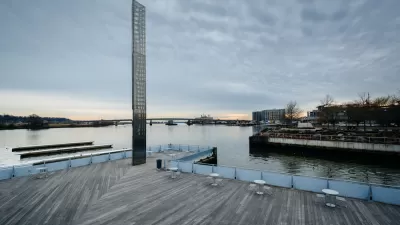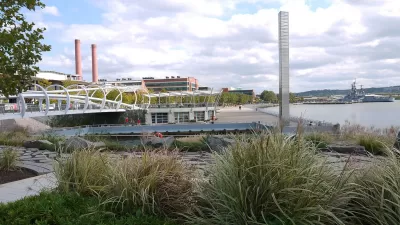A 20-year, $2.6 billion Clean Rivers Project intended to eliminate sewage discharge into D.C. area waterways will benefit the entire region. So, Carol O’Cleireacain asks, why only stick Washington's residents with the bill?
In an opinion piece for The Washington Post, O'Cleireacain, a nonresident senior fellow at the Brookings Institution's Metropolitan Policy Program, argues that because the entire region will benefit from the ambitious project being led by D.C. Water to clean up area waterways, they should be an integral part of planning, implementing and funding the cleanup strategy.
"Cleaner water flowing from the Anacostia and Potomac rivers in the District means that downstream jurisdictions have less of a pollution problem to address. Additionally, the effectiveness of water quality improvements taken by jurisdictions upstream of the District are lessened if the Potomac and Anacostia rivers become more polluted while passing through the District."
Citing regional transportation planning as a precedent for cross-jurisdictional cooperation to address regional challenges, O'Cleireacain recommends that, "The Metropolitan Washington Council of Governments and D.C. Water should bring together the federal government, the states of Maryland and Virginia, the District and local jurisdictions to sort out a more rational system of payments for the benefits from the area's clean water."
"While no one looks forward to a new cost, the current, fragmented efforts do not match the scale of the problem."
FULL STORY: D.C.’s big sewer dig: Why the whole region should pitch in

Study: Maui’s Plan to Convert Vacation Rentals to Long-Term Housing Could Cause Nearly $1 Billion Economic Loss
The plan would reduce visitor accommodation by 25,% resulting in 1,900 jobs lost.

North Texas Transit Leaders Tout Benefits of TOD for Growing Region
At a summit focused on transit-oriented development, policymakers discussed how North Texas’ expanded light rail system can serve as a tool for economic growth.

Why Should We Subsidize Public Transportation?
Many public transit agencies face financial stress due to rising costs, declining fare revenue, and declining subsidies. Transit advocates must provide a strong business case for increasing public transit funding.

How to Make US Trains Faster
Changes to boarding platforms and a switch to electric trains could improve U.S. passenger rail service without the added cost of high-speed rail.

Columbia’s Revitalized ‘Loop’ Is a Hub for Local Entrepreneurs
A focus on small businesses is helping a commercial corridor in Columbia, Missouri thrive.

Invasive Insect Threatens Minnesota’s Ash Forests
The Emerald Ash Borer is a rapidly spreading invasive pest threatening Minnesota’s ash trees, and homeowners are encouraged to plant diverse replacement species, avoid moving ash firewood, and monitor for signs of infestation.
Urban Design for Planners 1: Software Tools
This six-course series explores essential urban design concepts using open source software and equips planners with the tools they need to participate fully in the urban design process.
Planning for Universal Design
Learn the tools for implementing Universal Design in planning regulations.
City of Santa Clarita
Ascent Environmental
Institute for Housing and Urban Development Studies (IHS)
City of Grandview
Harvard GSD Executive Education
Toledo-Lucas County Plan Commissions
Salt Lake City
NYU Wagner Graduate School of Public Service




























